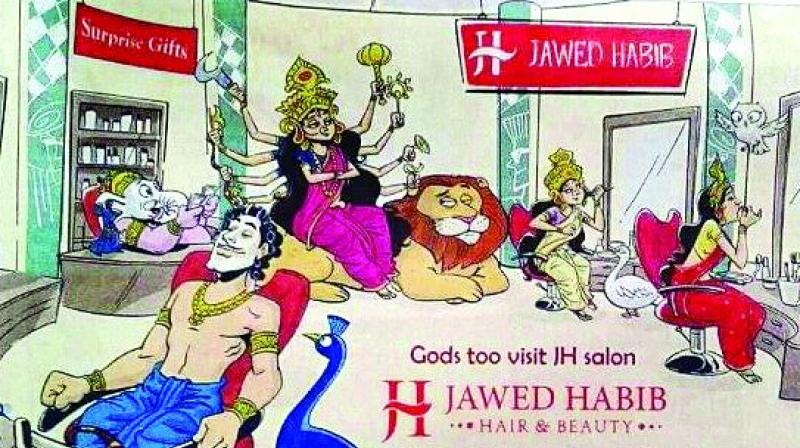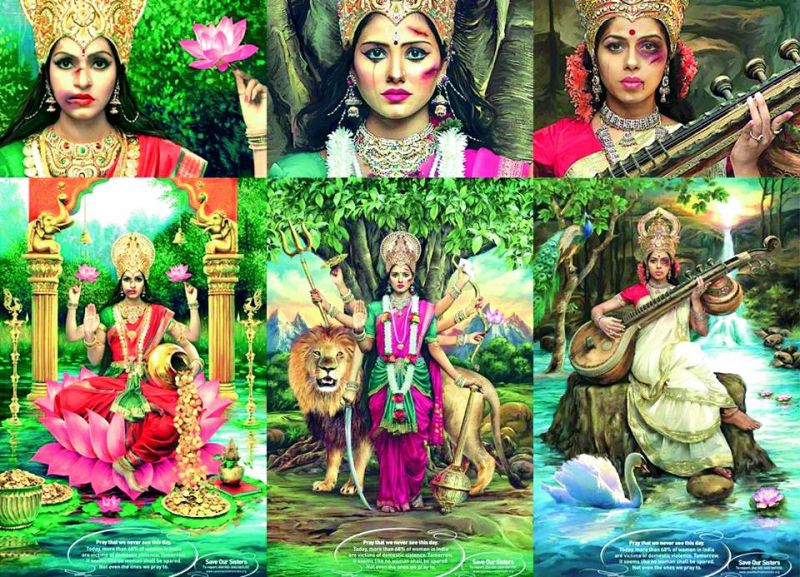Controversial advertisement

Renowned hairstylist Jawed Habib seems to have irked the religious sentiments of many on social media with an ad promoting his nation-wide chain of salons for the upcoming festive season. The print ad in question shows several Hindu gods — Durga, Ganesh, Karthik, Lakshmi and Saraswati — enjoying a spa day at a Habib’s parlour with the tagline ‘Gods too visit JH salon’. What was originally meant as a print ad for people in Kolkata avidly awaiting Durga Puja, became the topic of a social media storm.
The ad hurt the religious sentiments of many, who rushed to abuse and boycott Jawed and some even threatened to kill him; many made anti-Islam comments. Ignoring the context of the ad, the social media activists did not spare the chance to point out how Jawed was slighting another religion while leaving his own untouched.
At the end of the Twitter spat, the advertising group, on behalf of the Jawed brand, put up an explanation about the fact that the ad was simply a way to build up the excitement ahead of Durga Puja. Habib himself posted a video in which he denied all responsibility for the ad, claiming that it was printed without his knowledge.
He also apologised to his wide and varied clientele for hurting their sentiments. “My scissor is my only religion,” the hairdresser said in the video.
 An anti-domestic abuse campaign by Save the Children received flak when it depicted goddesses being abused
An anti-domestic abuse campaign by Save the Children received flak when it depicted goddesses being abused
Wary of starting a fire
Since many years now, Durga Puja ads with the goddess and her children featured in cartoons have been a common practise in Kolkata. “However, in the age of social media, one needs to be more careful as to what they print,” says Ajay Gahlaut, executive creative director of Ogilvy & Mather. “Nowadays, with social media, the reach of every ad is much further than it was a few years ago. It’s best in such situations to steer clear of religious themes since it is bound to hurt someone’s sentiments,” he says, adding, “And, it only takes one person’s hurt sentiment to start something on social media, since negativity is so easily spread.”
Concurring with this point, ad man Vinil Mathew adds that one shouldn’t run with a creative idea, unless sure about the social context. “A more mature copywriter would also keep the social background and the people for whom he is creating the ad in mind. If you end up offending your audience, which religion can do in a country like India, the ad doesn’t achieve its motive,” he emphasises.
Of religious rights and wrongs
This print idea is hardly the first instance of an advertisement hurting religious sentiments. Last year’s Patanjali ad earned flak from the Christian community in Bhopal because while calling for a boycott on foreign products, the clip showed the Christian cross thrice. An anti-domestic abuse campaign by Save the Children and Mumbai-based ad agency Taproot also received a lot of backlash when it depicted Hindu goddesses being abused.
Why then, do people continue to take risks with religious ads? Gopal M.S., creative director at Tailor India explains that sometimes, any traction is good. “Most advertising agencies don’t go with it because you have a responsibility and an image to maintain. It’s not the best way for advertising, and most companies certainly avoid it, but there are those who simply want to create some sort of stir on the Internet with their ad. It’s just a way to get attention,” he explains.
One of India’s top ad filmmakers, Abhinay Deo, however, questions the whole motto behind the trolling. “What exactly are we trolling here? Are we trolling Jawed because he follows Islam but chose Hindu religious idols for advertising purposes or are we trolling the use of religious idols in general for any kind of advertising? If this case is revolving or building up on the basis of the former statement, then, we, as a society, should be shameful as one can do a Google search (to understand the latter statement) to find ample number of advertisements depicting various kinds of idols being used to sell myriad kinds of products. We need to ask the right kind of question to start and sustain a debate.”
Abhinav adds that though such ads do run the risk of controversy, in certain contexts, the use of religious symbols is welcome. “People might not get offended when a halwai selling modaks chooses to depict Ganesha for branding during Ganesh Chaturthi.
— With inputs from Dipti

